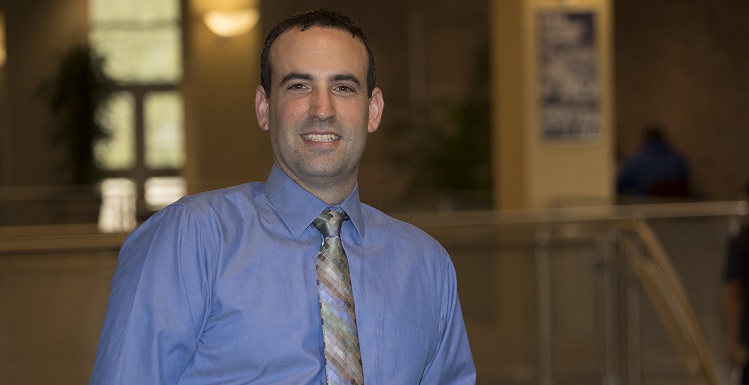Seven Films of Jewish Significance
Posted on January 16, 2018

The 2018 Mobile Jewish Film Festival began its run on Jan. 11 and will continue through Jan. 28 with showings throughout the area, including Jan. 16-18 at the University of South Alabama’s Laidlaw Performing Arts Center and Jan. 23 at USA’s Baldwin County campus in Fairhope. Tickets for the festival can be purchased by calling (251) 343-7197 or ordered by visiting the festival website. USA is a festival co-sponsor.
Dr. David Meola, the Bert and Fanny Meisler Assistant Professor of History and Jewish Studies at South Alabama, takes a look at several films with Jewish themes or in which Jewish directors, producers and musicians played prominent roles and that he believes have had a great impact on the film industry:
1. “Blazing Saddles” and/or “The Producers” (Directed, co-produced by Mel Brooks)
There are many films from Brooks which could easily fill my top-movie list, including “Spaceballs,” “History of the World: Part I,” and “Robin Hood: Men in Tights.” “The Producers” and “Blazing Saddles,” though, are not just funny, they go beyond the genre to do something more — they expertly satirize and set about doing so with razor-sharp focus. Whether it's commenting on race relations in the U.S. ( “Blazing Saddles”) or lampooning Nazis (both films, but even more in “The Producers”), Brooks is at his best inflecting his films with Yiddishkeit and taking on the entrenched structures and villains in society. One little fact: did you know that Richard Pryor was originally supposed to play the role that Cleavon Little deftly performed in “Blazing Saddles”?
2. “Shoah” (Directed by Claude Lanzmann)
This is one of the most important Holocaust documentaries ever created. Hundreds of hours of interviews condensed into nine hours of film that is both agonizing to watch, yet important for all to see. The interview with Abraham Bomba in the recreated barber shop (Bomba cut hair in Auschwitz) is one of the most powerful scenes in the movie. Lanzmann also interviews perpetrators and bystanders for his film.
3. “Schindler's List” (Directed, co-produced by Steven Spielberg)
This film is both masterful and controversial at the same time. Spielberg set the bar high in terms of historical representation. The black-and-white (greyscale) production gives the film a bite, and shows one remarkable story of an ambiguous character, Oskar Schindler, who both profited from Jewish slaves while saving many others.
4. “An American Tail” (Directed by Don Bluth)
For those of you who remember this animated film from the 1980s, the story of Faivel Mousekewitz and his family during the late 1800s from Russia to America was an animated representation of the journey of about four million Jewish immigrants to the United States after anti-Semitic pogroms in Russia. The song "There Are No Cats in America" is not just a great song, but highlights the "streets paved in gold" mentality of many of these immigrants.
5. “Fiddler on the Roof” (Music by Jerry Bock)
One of the most important Jewish movies of all time, “Fiddler” brought Jewish Broadway to the silver screen. As a musical, “Fiddler” set the stage as the first "Jewish" musical that specifically dealt with Jewish persecution and Jewish life, something that had not happened before. On film, the character of Tevye the Milkman (from Sholem Aleichem's short stories) brings Yiddishkeit to American audiences through vibrant characters, wit and song. Classic and important songs like "If I Were a Rich Man" and "Sunrise, Sunset" stir the hearts of many.
6. “Dirty Dancing” (Directed by Emile Ardolino)
As a teenager, I remember watching Jennifer Grey and Patrick Swayze dancing at a Catskills resort and enjoying summertime. Ah, the memories. For many Jews, especially from the Mid-Atlantic and Northeast, the Catskills resorts were the place to be and were the place Borscht Belt comedians got their starts. For teenagers and early 20-somethings, the clubs boasted of dancing, comedy and even intercultural romance.
7. “The Jazz Singer” (Directed by Alan Crosland)
One of the first mainstream Jewish entertainers in the United States, Al Jolson's character Jakie Rabinowitz/Jack Robin straddles the line between the Old World and New World, as he eschews his religious, cantorial family heritage for jazz and the stage. This film was certainly a product of its time, including the use of blackface in many scenes. This should be understood within the context of the complicated nature of Jewish life in the United states, Jewish integration into U.S. culture and the relationship at the time between the Jewish people and other minority groups. The film was one of the first to integrate picture and sound and was produced by the Jewish-owned production studio, Warner Brothers.
South Alabama’s Dr. David Meola specializes in German and Jewish history from the Enlightenment through the 19th century, with a focus on public expression and popular culture. Meola earned his bachelor’s degree from the University of North Carolina at Chapel Hill, and his master’s and Ph.D. degrees from the University of British Columbia. He is currently writing “German Jews and the Press: Interactions and Influence during the Nineteenth Century.”





